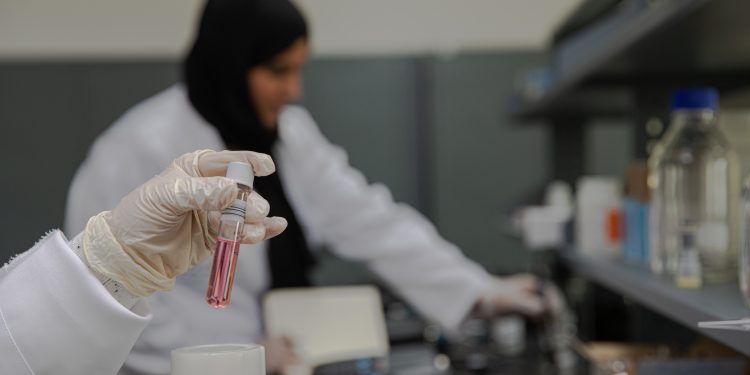Saudi Arabia has taken a significant stride in strengthening its position as a leader in biotechnology in the Middle East. As the largest regional market for pharmaceuticals and vaccines, the Kingdom has been proactive in its strategic investments within the biotech sector. Its unique genetic diversity and environmental conditions create a fertile ground for complex biotech studies and research.
There is a clear commitment from the Kingdom towards the cultivation of national talent in biotech, with a focus on research, development, and innovation. This is coupled with the establishment of a competitive and digitally advanced infrastructure.
Recently, Crown Prince Mohammed bin Salman unveiled the National Biotechnology Strategy, signifying a major boost for various biotech fields including biomanufacturing, food, genomics, vaccine production, and plant optimization.
The strategy has set ambitious goals including the localization of vaccine manufacturing and the enhancement of the overall health of Saudi citizens. Beyond health, the initiative is designed to protect the environment, ensure food and water security, and reinforce Saudi Arabia’s global leadership in biotech, as reported by the Saudi Press Agency.
Rabia Yasmeen, a senior consultant at Euromonitor International, views this as a pivotal move towards achieving economic diversification, as outlined in Saudi Arabia’s Vision 2030. She notes that biotech can bring significant value across various sectors, potentially improving disease treatment and enhancing human health and longevity.
At its foundation, biotechnology utilizes cellular and molecular processes to develop products and technologies. Today, it encompasses the creation of therapeutic proteins and genetically-engineered medications to address a wide range of health issues.
The Kingdom aims to leverage biotech to meet health and food requirements, with particular attention on plant optimization to support food self-sufficiency as the population grows.
According to Yasmeen, increasing agricultural productivity and yields could dramatically alter the economic landscape for Saudi Arabia, which relies heavily on imports. It could also lead to significant advancements in food security research and innovation.
Genomics and precision medicine are also emerging as critical areas of focus within Saudi Arabia’s healthcare sector. By developing medicines tailored to the genomic profiles of its population, the Kingdom seeks to address healthcare challenges, such as high obesity rates, and optimize the health and productivity of its citizens.
Jassim Al-Shammari, founder of the Saudi Industrialists and Exporters Platform, believes that the National Biotechnology Strategy will be transformative for the Saudi economy, helping to establish a robust pharmaceutical industry, reduce import reliance, and bolster economic autonomy.
Al-Shammari also highlighted the strategy’s emphasis on digital transformation and technological progress in pharmaceutical industries, which could lead to the development of new, effective, and safe medicines.
A recent report by Strategy & Middle East suggests that Saudi Arabia has the potential to become a global biotech leader. Claudia Palme, a senior executive adviser, emphasized the country’s focus on creating a conducive environment for the sector’s growth, including public and private sector cooperation.
Investment in research and development, amounting to about $3.9 billion since 2021, and the establishment of cutting-edge biotech infrastructure, are among the Kingdom’s efforts to realize its ambitions. This is supported by a systematic review of regulations to foster a business-friendly environment.
Vision 2030 forecasts the creation of approximately 11,000 jobs due to the strategy, with the possibility of reaching 55,000 jobs over the next decade. Economically, it’s projected that the strategy will contribute $34.6 billion to the non-oil GDP, underscoring the ongoing diversification away from oil dependency.
As per the International Monetary Fund, Saudi Arabia has seen an average growth of 4.8 percent in non-oil revenues. Goldman Sachs Research analyst Faisal Al-Azmeh notes that since the inception of Vision 2030, the non-oil economy has seen substantial growth through investments in strategic economic sectors.
Reflecting the burgeoning opportunities, biotech startups have been increasingly seeking funding from within the Kingdom. Rubedo Life Sciences’ chief business officer, Ali Siam, acknowledges the growing relevance of the Gulf region within the biotech ecosystem.
Yasmeen also points out that the move into biotech holds intriguing prospects in areas like biofuel production and renewable energy, positioning Saudi Arabia to shift the global energy narrative and mitigate criticism regarding its oil production.
Ussal Sahbas, a policy consultancy founder in Turkiye, sees the National Biotechnology Strategy as critical not just for health but for sectors such as materials, manufacturing, and agriculture that are vital for the Middle East’s future. He stresses that biotech should be an integral part of the technological diversification pursued within Saudi Arabia’s 2030 Vision.


